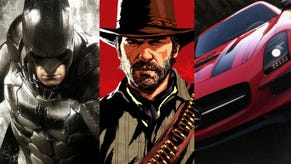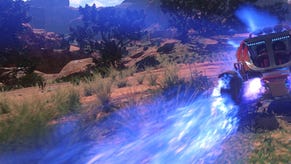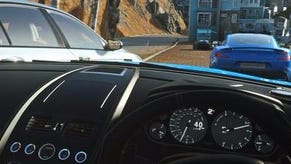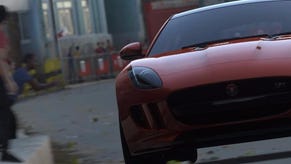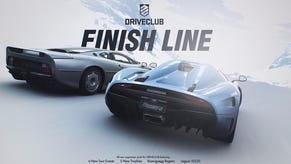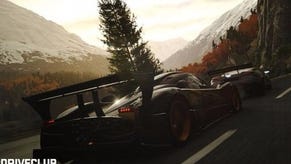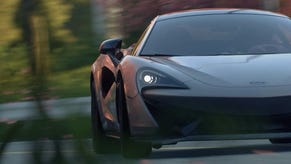DriveClub review
Clubbed to death.
Picture the scene. You're diving down an 18 per cent gradient hill along the banks of Loch Something-or-other, exhaust note screaming, tumbledown stone walls a blur as the speedometer ticks over 160mph. You're approaching a corner and billowing red flags on the right-hand side of the road warn that it's a severe left-hander, but the flatter you can make your racing line the more speed you can carry through it.
Spying a generous dusting of loose gravel on the apex, the 1000hz portion of your lizard brain that's dedicated to driving cars fast instinctively decides to drop two wheels on the dirt. At the very least it'll straighten the line through the bend and, if you're really lucky, you can even use some drag to help rotate the car for a swift exit.
Except you don't get your swift exit, because a giant, invisible hand has pinched the car's spoiler betwixt thumb and forefinger. You're dimly aware of a repetitive chiming sound as the speedo tumbles to 45mph. The DriveClub fun police have arrived, and this is their siren.
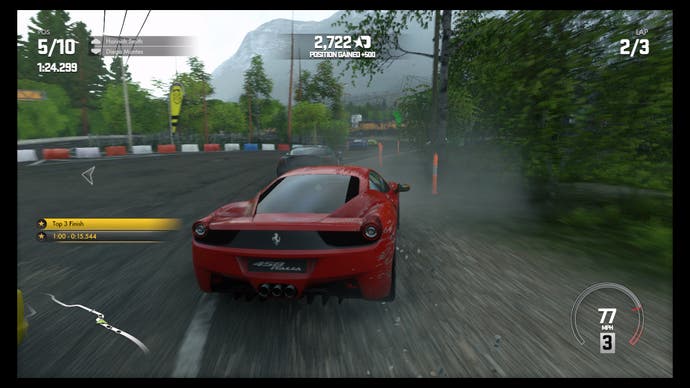
It's a shame that one of the few ways that DriveClub expresses any kind of personality is in this jarringly punitive corner-cutting and collision penalty system. For the most part, Evolution's troubled title is desperately searching for an identity. It feels less like a coherent racing game and more like an alarmingly slight support structure for a series of car and track combinations. You'll cycle through the menus multiple times, wondering if you've missed some huge, rich chunk of game. You haven't.
It's baffling that the studio that produced MotorStorm, which did the automotive festival thing long before Forza Horizon hit the scene, could create something so devoid of soul. There's a brief, choppily edited first-person cut-scene of you climbing into your car before every race, but otherwise this might as well be a dystopian future where humanity is extinct and Skynet races driverless cars against each other to compute the empirical racing line.
The single-player 'Tour' is about as bare-bones as any career mode I've experienced, amounting to a dry list of events that's presented in its modest entirety to be ticked off in a day or so's enthusiastic play. Finish the final Legends Cup and there's no acknowledgement of your achievement whatsoever, you're just dumped unceremoniously back to the event list.
The only wrinkle in your otherwise friction-free ride to the top occurs towards the end of the Tour when the two relevant progression systems (stars to unlock events and fame to earn cars) can work their way out of sync. Grind a couple of levels to 25 by tidying up previous races or multiplayer events to unlock the irresistible force that is the Hennessey Venom GT and you'll be able to polish the final few events off and experience the same hollow victory.
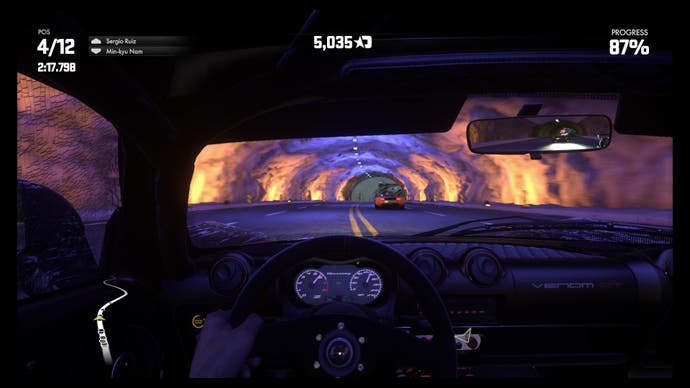
Still, DriveClub is positioned as the ultimate social racer, rather than a particularly compelling solo affair. It's appropriate, then, that the game's most notable positive contribution to the genre is the addition of Face Off challenges that are overlaid on the circuit as you race. On certain short sections, you'll be tasked with beating another player's score in one of a trio of skill challenges; tests of average speed, adherence to the correct racing line and drifting.
Friends and clubmates are prioritised as rivals and whether you win or lose, the feedback is instant. It's a welcome and novel distraction from the more conventional business of racing in DriveClub and part of the thrill is balancing whether you can afford to yank the handbrake to perform a lazy, speed-sapping drift and still make it to the line first at the end of it all.
Beyond that, the game's social suite is essentially Need For Speed's Autolog. There's the option to manually issue your own duration-limited challenges, but not at the granular level of Face Offs. It's just a case of turning one of your recent race or time-trial completion records into a benchmark, but that simply doesn't have the fizzy immediacy of an automatically served, five-second mid-event challenge, which offers the potential for multiple miniature victories over actual humans in every race.
And that's just about the extent of the social interaction. Being part of a club does allow you to unlock a handful of cars that can't be attained any other way - and if you're in a club with friends, there's an undeniable pleasure in all receiving a hard-earned car at the same time - but there are always others in the same class that do the job just as well. Yes, joining a club will enrich your experience of DriveClub, but only very slightly. Still, at least Sony (eventually) resisted the urge to put a hashtag in the title. Small mercies.
You'll note that I've barely mentioned the experience of actually playing DriveClub yet, beyond those infuriating, horsepower-hobbling penalties. That's because the racing itself is adequately entertaining but ultimately forgettable. In the interests of accessibility, on a DualShock 4 the handling quirks of the cars are largely smoothed out by the responsive-yet-chuckable physics model. It's not until you reach the hypercars that individual characteristics - usually a tendency towards lethal snap oversteer, at those speeds - are brought into relief.
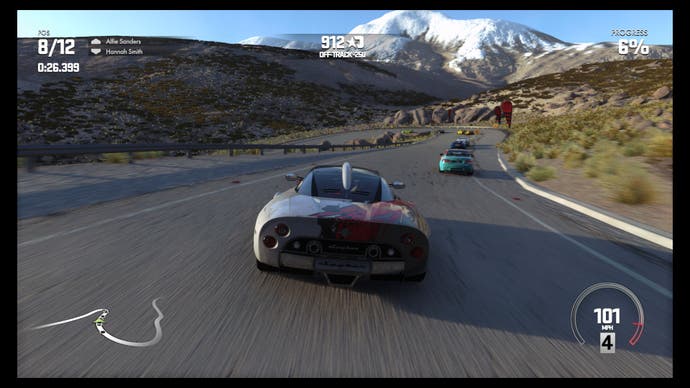
It's a similar story with the circuits. The decision to opt for lesser-spotted locations such as India, Norway and Chile is admirable, but individual configurations and routes aren't distinct enough to stick in the memory. The highlights are almost always the point-to-point races - mad dashes that snake their way through expansive environments and usually reward you with the most breathtaking vistas and dramatic undulations.
Those vistas come at a cost, though. Evolution's artists appear to have chosen scale and atmosphere over outright fidelity, with varying mileage - the trees in Canada are crude cardboard cut-outs, for example, but there are approximately a thousand of them on a single mountainside, which is undeniably striking. Occasionally the game will get the alchemical combination of scenery, weather and lighting just right and the visuals will really sing.
The problem with DriveClub is that it's just competent. You'll drive some fast cars in some arresting environments. You might even have fun, in between getting clobbered with penalties. But there's no romance to it. No passion. What there is, however, is the lingering sense that the gaps were supposed to be filled by the much-touted social features - the fires were to be stoked by human rivalry. Sadly, beyond those bite-sized Face Off challenges, which are essentially side missions, there's nothing particularly engaging or new here.
What we're left with is a flimsy framework - a sort of clothes horse for content - rather than a truly great racing game. DriveClub is patently intended to attract a global, interconnected audience of fiercely competitive racers but, to quote the increasingly obscure 1989 Kevin Costner film Field of Dreams: if you build it, they will come. And, unfortunately, Evolution hasn't quite built it.


